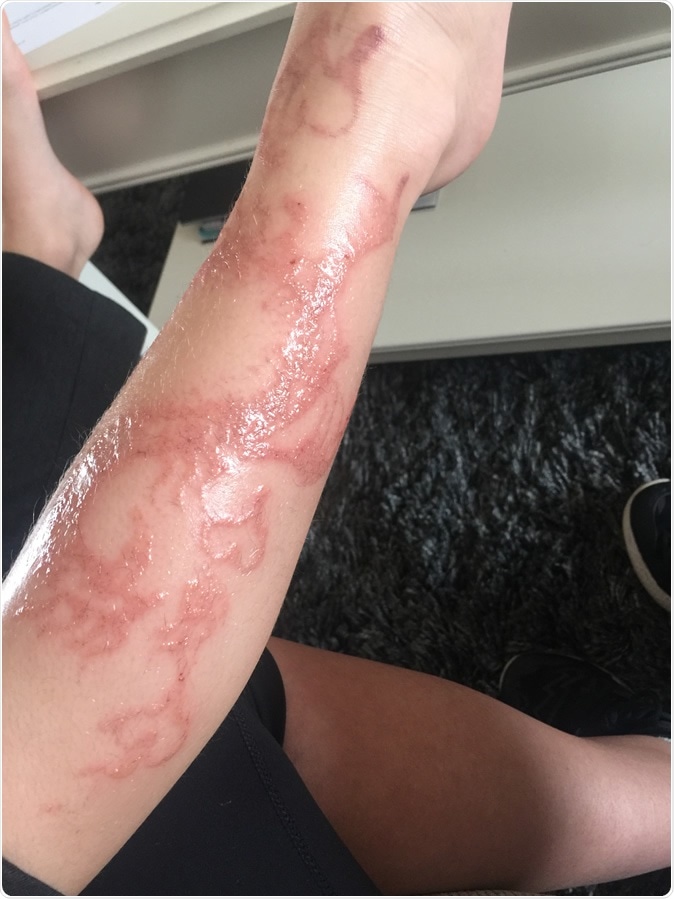Atomic Kitten Natasha Hamilton is backing a British Skin Foundation campaign to #AvoidBlackHenna as summer approaches. She joins us in warning the public of the dangers of so-called ‘black henna’ temporary tattoos (BHTTs) after her son suffered a reaction earlier this year. Upon returning from a holiday in Morocco, Alfie aged six was left with a scar on his leg where the BHTT had been.
Natasha said, “I am backing the British Skin Foundation's #AvoidBlackHenna campaign as there needs to be a greater awareness of the potential permanent dangers posed by Black Henna tattoos. Sharing my photograph of Alfie's scarred leg will hopefully highlight these dangers and will act as a warning to parents who might not know the risks attached to these so-called temporary 'black henna' tattoos. Having witnessed first-hand Alfie's terrible reaction to Black Henna, it’s just not worth the risk of permanent damage and letting your children have one done at home or abroad.”

Scar from Black Henna tattoos
The majority of BHTTs are not based on henna at all, but a substance called para-phenylenediamine (PPD) which is found in hair dyes. PPD is allowed for use in hair dye, but its use for skin contact products such as temporary tattoos is illegal in the European Union.
When PPD is used on the skin in this way it can cause blistering, painful skin burns and may even lead to scarring. It can also leave the person with a lifelong sensitivity to PPD, which increases the risk of a severe allergic reaction when using hair dye in the future.
Research among dermatologists in 2015 revealed that they were seeing an increase in reactions at their clinics across the UK.
- 4 out of 10 dermatologists asked had seen patients with skin reactions to BHTTs.
- 1 in 20 dermatologists approached said that over 80% of the BHTT reactions they had seen were in children aged under 16.
- Dermatologists asked confirmed that around half of the patients got a BHTT outside of the EU, where the legal status of PPD is not always clear; however the other half got a BHTT within the EU, with 27% of these in the UK.
- About two-thirds of dermatologists approached have seen an increase in patients with reactions to hair dyes, many of whom have previously had a BHTT.
Dr Anjali Mahto, Consultant Dermatologist & British Skin Foundation Spokesperson reinforced these findings saying, “Black henna is well known to cause skin reactions and should be treated with caution, particularly in children.”
The decision to re-issue this warning in 2017 is backed by the Cosmetic, Toiletry & Perfumery Association (CTPA). “The message is clear: having a ‘black henna’ temporary tattoo presents a significant risk of a very nasty adverse reaction to the tattoo itself. It also increases the risk of either not being able to use most hair dyes in the future or having a bad reaction to them if the warnings are ignored. Most importantly, parents will want to safeguard their children this summer by steering clear of so-called ‘black henna’ temporary tattoos.” Dr Christopher Flower, Director-General CTPA
So remember, avoid black henna this summer at festivals, funfairs and on holiday!
Join the discussion on Twitter #AvoidBlackHenna
Notes
The British Skin Foundation survey was undertaken at the British Association of Dermatologists’ Annual Meeting between the 6th and 9th July 2015 in Manchester. Only dermatologists were invited to take part and were identified by their delegate badge. 244 completed the survey of which 56 were male and 188 female. The survey included questions from the British Skin Foundation, other companies as well as the CTPA. It was blind, unbranded (due to it being run on the British Skin Foundation stand) and respondents received no financial reward.
About the BSF
The British Skin Foundation is the only UK charity dedicated to raising funds for skin disease and skin cancer research. Our unwavering commitment to funding quality research means we won’t stop until we’ve found cures for common skin problems like eczema and acne through to potential killers like malignant melanoma. To date we’ve raised £15 million to fund research projects since 1996.